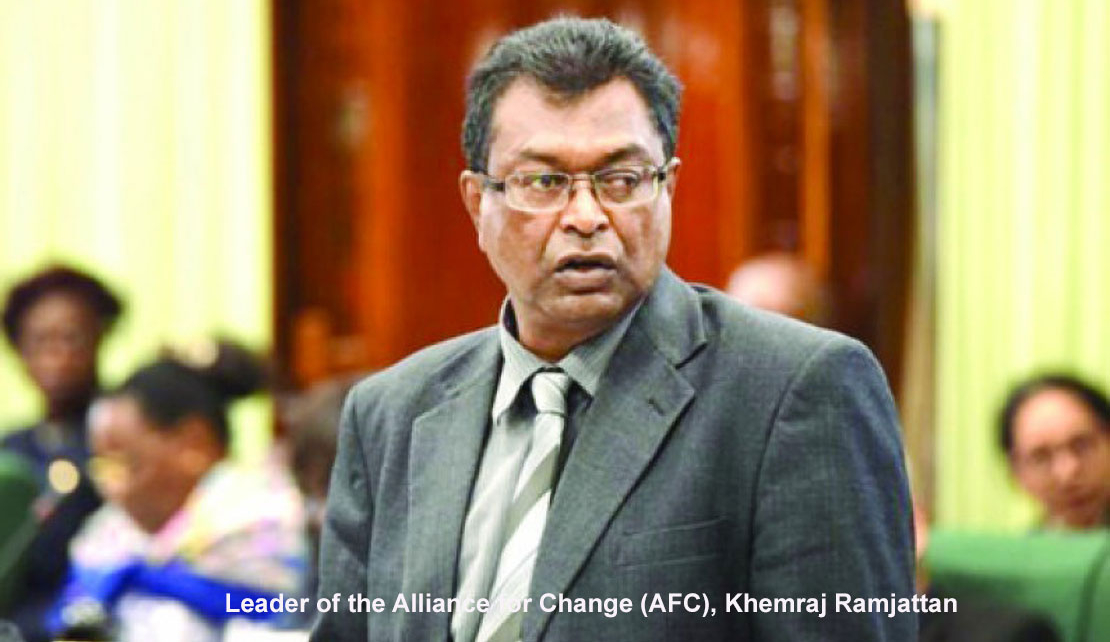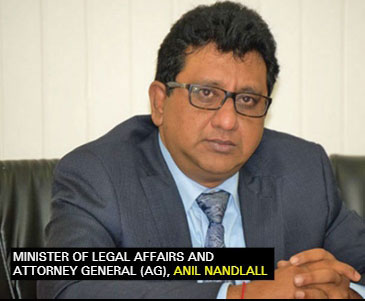GUYANA | Ramjattan schools AG Nandlall on difference between The Natural Resource Fund and The Consolidated Fund

Georgetown, Guyana, January 15, 2024 - Leader of the Alliance for Change (AFC), attorney-at-law Khemraj Ramjattan, has delivered a stern lesson to Attorney General and Minister of Legal Affairs, Anil Nandlall SC, on the difference between the Natural Resource Fund (NRF) and The Consolidated Fund, and how they should be managed according to law.
 In a statement Ramjattan drew attention to the difference of understanding between Nandlall and chartered accountant and attorney-at-law Christopher Ram concerning the NRF and what revenues should not be in it, and the Consolidated Fund and what revenues should be in it, from the receipts of Guyana’s share of the oil monies consequent upon the 2016 Profit Sharing Agreement (PSA).
In a statement Ramjattan drew attention to the difference of understanding between Nandlall and chartered accountant and attorney-at-law Christopher Ram concerning the NRF and what revenues should not be in it, and the Consolidated Fund and what revenues should be in it, from the receipts of Guyana’s share of the oil monies consequent upon the 2016 Profit Sharing Agreement (PSA).
Ramjattan, who is also a Member of Parliament, upbraided his parliamentary and professional colleague, Nandlall for his ignorance on the matter.
The AFC leader pointed out that the Natural Resource Fund was a sovereign wealth fund created under a special separate law to govern, manage, invest and use the oil revenues.
This fund, he explained, has a completely different structure and purpose from the Consolidated Fund which is effectively the operating Fund for the financial operations of Ministries, Departments, and Budget agencies and managed by public servants in a decentralised framework.
Asserting that given the separate purpose of the two Fund under the law, the AFC is demanding the oil company’s corporate taxes paid by the Government to the Guyana Revenue Authority be sent to the Consolidated Fund and the rest of the the oil earnings go to the NRF.
Flaying Nandlall for his ignorance of the law Ramjattan further explained the supremacy of the law on this situation must lie in the Constitution (Article 216) and the specific Section 38(1) of the Fiscal Management and Accountability Act (2003) rather that the NRF, as erroneously argued by the Attorney General.
The following is the full text of Ramjattan’s statement :-
NATURAL RESOURCES FUND VS. CONSOLIDATED FUND
By Khemraj Ramjattan MP
The Alliance For Change (AFC) has noted the debate between A G Nandlall SC and Mr. Christopher Ram concerning the Natural Resource Fund, NRF and what revenues should not be in it, and the Consolidated Fund and what revenues should be in it, from the receipts of Guyana’s share of the oil monies consequent upon the 2016 PSA.
There is undoubtedly a misapprehension if not an incomprehension by the Government’s Chief Legal adviser on the issue. The AFC commends Mr. Ram for bringing clarity to the public on the matter; and, to force an understanding into the Learned AG when a series of questions were posed to him. These questions are still to be answered by the AG who has surprisingly gone non-responsive.
As is correctly posited by Mr. Ram, the NRF is a sovereign wealth fund created under a special separate law to govern, manage, invest and use our oil revenues. This fund has a completely different structure and purpose from the Consolidated Fund which is effectively the operating Fund for the financial operations of Ministries, Departments, and Budget agencies and managed by public servants in a decentralised framework.
Since the payment of the taxes for Exxon must be paid out of the revenues from the Guyana Government, pursuant to the terms of the 2016 PSA, and since this Government believes in sanctity of contract, it necessarily follows that the corporate taxes must be paid to GRA and placed into the Consolidated Fund. This payment thus lessens the amount received into the NRF. Our Consolidated Fund is increased to the extent of that amount.
The point as to where public monies should be deposited was apparently missed by the AG.
The AFC wishes to remind that section 38(1) of the FMAA2003 provides:
“All public monies raised or received by the Government shall be credited fully and promptly to the Consolidated Fund, except—
- a) Monies credited to an Extra budgetary Fund as stipulated in the enabling legislation establishing that Fund;
- b) ……..
- c) ……..”
This statutory provision accords with article 216 of the Constitution which provides: “All monies or other monies raised or received by Guyana( not being revenues or other monies that are payable, by or under an Act of Parliament, into some other fund established for any specific purpose or that may, by or under such an Act, be retained by the authority that received them for the purpose of defraying the expenses of that authority) shall be paid into and form one Consolidated Fund.”
The AFC asserts that the NRF and the Consolidated Fund are thus separate things. So the oil company corporate taxes paid by the Government to the GRA must be sent to the Consolidated Fund. The rest of the oil earnings must go to the NRF.
So the supremacy of the law on this situation must lie in the Constitution (article 216) and the specific section 38(1) of the FMAA 2003 rather that the NRF, as erroneously argued by the AG.
The act of leaving the revenues of in the NRF fattens this Fund to the corresponding thinning to the Consolidated Fund.
Since the NRF is to be only used as per section 16(2) of the NRF to finance “national development priorities” and “major national disasters”, this NRF will continued to be abused as the Government will declare any contract to its friends and family as national development priorities. There is thus a method to the madness of overstating the NRF to the extent of an equivalent understatement of the Consolidated Fund.
